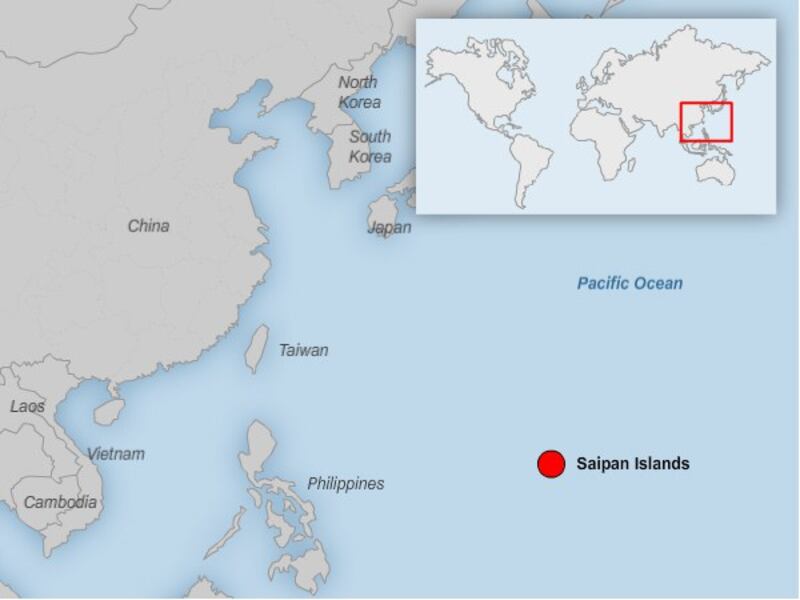Pregnant women from mainland China are fueling a baby boom on the little-known U.S. Pacific Island of Saipan after a clampdown on birth tourism by the Hong Kong government.
Many pregnant women, mostly from China and South Korea, have been arriving as tourists on the island, which is part of the Commonwealth of the Northern Mariana Islands (CNMI), in recent months.
"There has been an increase in the numbers of Chinese tourists arriving in Saipan," said an employee who answered the phone at the Canton Hotel in Saipan, which caters mostly to tour groups and individuals from China.
"Quite a lot of mainland Chinese women are coming here to give birth," she said. "There are several flights a week from the Chinese mainland."
The government of Hong Kong limited the number of mainlanders who can give birth in the city to 34,000 in 2012 following public anger over what was seen as an increasing number of mainland mothers taking advantage of the health and educational benefits that come with citizenship for their babies.
Now, Chinese nationals are flocking to Saipan, which they need no visa to enter as tourists, to give birth on the island to children who can automatically become U.S. citizens regardless of the nationality of their parents.
The parks of Saipan are thronging with pregnant Asian women taking their regular exercise, while they are a increasingly common sight at the island's only hospital, the Commonwealth Health Center.
A birth tourism industry has sprung up in recent years to cater for pregnant Asian women who can give birth to a U.S. citizen on the island for an estimated U.S. $20,000, depending on hospital fees.

Booming tourism
Ding Hongxia, who heads a company selling birth tourism packages to Chinese women, said her company added Saipan as a destination in 2010, and currently sends "about one or two women a month" to the island.
Ding, whose Ya'an Qile International Consulting Co. started up eight years ago to send pregnant women to give birth in Hong Kong, said that a total package could set a couple back by around U.S. $20,000, including around U.S. $6,000 in fees to her company.
"Our local representative has been in Saipan for many years and is very influential there," Ding said, adding that the average birth tourism stay lasted around three months.
She said her company processed the women's visits by the book, while others offered cheaper stays in illegal dormitory-style accommodations.
"If someone reports you, then the border authorities will detain you, which is why our clients stay in hotels, which is legal," Ding said.
Citizenship
While the South Koreans who give birth there may simply be motivated by the prospect of U.S. citizenship, many of the mainland Chinese women who go there are also escaping draconian "one-child" family planning policies imposed on urban couples by Beijing.
The growing popularity of the United States as a destination for high-schoolers and university students is also a huge factor, as the non-U.S. parents of American citizens can bring them along if they relocate there for work or study, local media reports said.
Some of the women who give birth to U.S. citizens have remained on the islands long after their tourist visas expire, boosting illegal immigration figures while they wait for their child's birth certificate to be delivered.
Earlier this year, growing concern over the phenomenon prompted calls from CNMI officials for tighter border controls and measures to address the issue from Washington.
Ding said immigration authorities had begun patrolling U.S. passport offices in recent months for parents of newborns who may have overstayed their tourism visas in order to wait for their child's passport.
"If they are going to do that, then my representative has very good relations with a lady in the passport office who used to be his girlfriend ... so she will call him and tell him not to go there to apply for a passport that day," she said.
"Last March, some people were deported, but not one of our clients had this happen to them."
Post-partum care
The birth tourism industry has also given rise to post-partum guesthouses catering to the needs of Chinese women who traditionally go through a month of total rest after childbirth.
"Last year, we successfully hosted 50 mothers who had babies here from mainland China," said the proprietor of one guesthouse surnamed Jing.
She said her guesthouse charges around U.S. $11,000 for full board, hospital nurses, post-partum care, translation, chauffeurs and all documentation.
Mothers can expect to pay a further U.S. $7,000-12,000 in medical bills on top of that, she said.
However, an American son or daughter is a luxury that is still only affordable to the richest Chinese families, as hospital bills must be settled in full before a U.S. passport can be issued to a newborn, local media reported.
Some on Saipan say that birth tourism has boosted the islands' economic growth, because pregnant women spend lavishly on medical bills, apartment rentals, car rentals, translation services, as well as food and other retail sales.
However, not all birth tourism agencies operate within the law.
Last August, Taiwan national Chen Kuan-yi was jailed by the CNMI District Court for nine months for encouraging the illegal entry of aliens for financial gain, and for harboring aliens for financial gain in connection with a birth tourism scheme, the local Islands Business news website reported.
Reported by Pan Jiaqing for RFA's Cantonese service. Translated and written in English by Luisetta Mudie.
